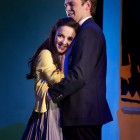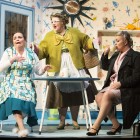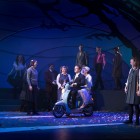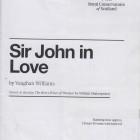Sir John in Love 2015Royal Conservatoire of Scotland
Read more about the opera Sir John in Love
Following the Verdi and Nicolai adaptations of the Falstaff story in recent seasons, for the Conservatoire to follow up with Vaughan Williams' work Sir John in Love derived from the same source was both adventurous and eagerly anticipated.
Vaughan Williams may not be an archetypal opera composer. Of his theatrical works, Riders to the Sea is a dramatic masterpiece, previously staged successfully by the RSAMD. By comparison with Sir John in Love it is short, and benefits from the use, almost verbatim, of the play text left by Synge. The texts for his later full-length operatic works, Sir John in Love and The Pilgrim's Progress, were adaptations of great English writers, Shakespeare and Bunyan respectively. This is no guarantee of engaging musical theatre. Nevertheless, with Sir John in Love he produced a charming and thoroughly enjoyable comedy using a mix of folk melodies and original compositions that sound as though they are equally traditional.
In tackling this theme, Vaughan Williams was determined to create a work very different from its two nineteenth century predecessors. In that he certainly succeeded. His adaptation leaves in a multitude of relatively minor characters that have the effect of diluting to some extent what might be domination by Sir John himself. The efforts of the three rivals for the hand of Anne Page are in some respects more important than Falstaff's own dalliances. The main weakness is structural - the opera offers little sense of momentum or pacing. Many of the obvious opportunities for comedy and drama are missed - the laundry basket episode simply seems bland and comes very late on in the final act. There are many highlights however, including the various scenes for Fenton and Anne and the last act reconciliation between the Fords. The interpolation of 'Greensleeves' sung by Alice Ford as she awaits the arrival of the fat knight is masterly.
Certainly there can be no complaints about the musical side of this production. Timothy Dean's orchestra gave maximum effect to the beautiful writing. The singing was uniformly fine, with a welcome clarity of diction all round. Of course this also shows how cannily composed that aspect of the work is. Arshak Kuzikyan in the title role displayed a delightfully full-voiced bass sound and plenty of character.
The direction by Benjamin Davis, in the designs of Giuseppe and Emma Belli, is, for the most part successful. The action is updated to the 1950s, so Bardolph, Nym and Pistol are 'teddy boys'. The scene where Fenton proposes in front of Anne's friends has the boys in rugby kit and the girls dressed for hockey, evoking a sense of St Trinian's. The young couple were duly chaired off in style. Whether the Host would have been allowed near a golf course so casually dressed in 1950s Berkshire is, however, debatable. Fenton has an appropriate scooter for the couple's departure at the end.
The design for the first two acts worked well, with a Windsor street, in very exaggerated perspective, narrowing into the distance. The building front right opened out as the Page residence where much of the wives' plotting occurred. To front left we then had the saloon of the Garter Inn, including Sir John's capacious armchair. There was even a dartboard, disconcertingly attached to a door - Health & Safety clearly not a priority in those days.
The set opened out for the last act, and was less appropriate for the Ford abode - but to have Alice reclining on the laundry-basket as she awaited her suitor was a nice touch. The choreography by Kally Lloyd-Jones had few opportunities, and there was occasional overuse of silly walks and such, but the final lineup allowed the cast to display a peculiarly apt blend of 50s/60s popular dance with morris dancing. It sounds weird - but it was great fun.
In all, this was a thoroughly enjoyable opportunity to see an opera that is unlikely to be performed often. While by no means a masterpiece, it contains many good things, with plenty of small roles for students to demonstrate their talents. The RCS is again to be commended.
Performance Cast
- Sir John Falstaff a portly knight
- Hugh Evans a Welsh parson
- Abraham Slender a country gentleman
- Peter Simple Slender's servant
- George Page a Windsor townsman
- Bardolph a tippler and follower of Falstaff
- Nym a cutpurse and follower of Falstaff
- Pistol a braggart soldier and follower of Falstaff
- Margaret Page's wife
- Anne the Pages' daughter
- Alice Ford's wife
- Fenton a gentleman of the Court
- Dr Caius a French physician
- John Rugby Caius' servant
- Nell Quickly Caius' housekeeper
- Host of the Garter Inn
- Frank Ford a Windsor townsman
- Robert Shallow, JP Slender's uncle
- Robert the Fords' servant
- John the Fords' servant
- William the Pages' son
- Robin Falstaff's page








